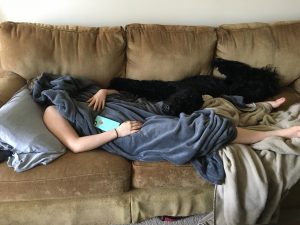I’ve been working on an educational post, but instead I decided to post something personal. Something that I, just like most 20-something year old women, too often let define me. My weight.
The semester before I was diagnosed with UC I was considered slightly overweight (I probably needed to lose 10-15 pounds, but at 21 it seemed like 100) and suffered from symptoms of unknown origin. I wasn’t obese but I was puffy, uncomfortable, embarrassed, and exhausted. I was so determined to lose the extra pounds, I registered for a jogging and conditioning class even though I knew my body could not handle the stress. I spent most of the class time pretending to get water while I was actually getting vehemently ill. Basically… I was an idiot.
Fast forward 3 months. I lost 30 pounds in 30 days. During those days I barely had the strength to sit up, much less look in the mirror. I first saw my “new self” in the door of the hospital elevator. I almost asked my mom why that little girl was staring at me until I realized she was me. I laughed at first… then I cried. My clothes hung off me, my bones were showing, and I had zero muscle mass. Obviously I already knew this, but actually seeing it somehow made it much more real. For the first time, I realized how seriously ill I actually was, and I was terrified.
One month later I had gained about 5 pounds. I was determined to go back to college (under doctor supervision) but all of my clothes were way too big. My mom drove me to the store, and for the first time in my life size 0 tops and skinny jeans actually fit. Everyone assumed that would be fun for me, but it wasn’t. Try as I may, I could not see myself in the girl in the mirror. I started crying, and the lady in the next stall asked my mom if I was ok. “I just don’t see me…I don’t know where I went….” We found two outfits before I completely broke down.
Fast forward two weeks. I returned to school, and an acquaintance mentioned that he knew I had been really sick, but “Dang, I looked hot.” I went home and cried. Did he not understand the pain that accompanied being so tiny? Did he not know how much I wished my legs were stronger, or realize how uncomfortable I felt in my new shorts? Did he not know the reason I looked “so hot” was I was too afraid to eat? What did that mean about how he saw me before my illness?
I spent the semester on and off steroids. I had a ravenous appetite, and by Christmas I had gained around 20 pounds. All of my new clothes were too small, and all of my old clothes were still too big. I had failed at keeping my new “hot, tiny body…” and I cried.
Two weeks later I experienced another flare and dropped back down to the “almost dangerous” skinny zone. I cried. My mom cried. My clothes fit, but I looked like a skeleton again.
Three months later I finally achieved remission and returned to school once again a size 0. “At least this disease made you skinny,” they said. And I cried. By graduation I had to buy a dress that was a size 4. I was still tiny but had gone up 2 sizes in 2 months. My clothes became too tight again.
I ordered my wedding dress and told the seamstress I did not know if I would need it taken in or let out. “How much weight could you lose or gain?” she asked. “Possibly 30 pounds more or less.” She had her work cut out for her.
I gave away my “big” clothes, assuming I would never weigh the same as before my diagnosis. I follow a paleo diet… there was no way. I started graduate school. I gained my appetite back…. And I gained the weight back. At Christmas, I packed my shorts for a trip to Florida. When I got there I realized I could no longer zip them. I cried. I decided I would lose weight, tighten up my diet, cut out treats, really try… and I still gained weight.
I now weigh almost exactly what I weighed before my diagnosis. This time, I am not puffy. This time I look healthy and feel good. This time, I have muscle. But this time… I remember the many times I was told how good I looked when I was “so thin.” I wonder if people judge me for gaining 30 pounds in a year. I wonder if they thought I was too thin back then, or they think I am too big now.
My family tells me I am always beautiful… and I cry.
I share this with you to make a very real point about living with chronic illness. There are times when we gain weight and become “puffy”. There are times when we lose weight and look like skeletons. There are times when we are in between. There are people that have had even more drastic weight changes than me due to flares and medication. Autoimmune disorders have a very real impact on all aspects of the body, and this includes your weight.
Weight fluctuation is a very real part of living with an autoimmune disorder. Your appetite and energy level fluctuate. You are put on steroids and gain 20 pounds in two months. Or, life gets in the way, and you gain weight just like anybody else… even if you are eating paleo.
Throughout it all, we are on mood-altering medication, losing our hair, trying to cover up rashes, and struggling to keep our heads above water. Yes, I hated seeing my ribs, but I loved when someone would say, “You look so good. I mean, I love how tiny you are!” My weight has been a constant struggle for me, and maintaining a specific weight has been impossible. I have 3 pairs of the same pants in 3 different sizes that I had to buy in a 3 month span (yes, that is a lot of 3s).
Today, I am exercising, I am eating right, and I am trying to love my body just the way it is. I am trying Crossfit to make myself more toned, and I am cutting back on bad snacks. I am listening to my friends and family more, and focusing on how I look less and less. I am realizing steroids will make me balloon up, and flares will make me drop weight quickly. I may always have a stash of clothes in the back of my closet in case I gain/lose weight…. And that is ok.
When you see someone with an autoimmune disease, take a minute to think about how they got to their current weight. People with chronic illness range from 80-400 pounds. Some people are gaining weight due to lifestyle restrictions and steroids. Some people are losing weight due to malnutrition. And it is always hard. Love us just the way we are. Sometimes it is hard for us to love ourselves.



